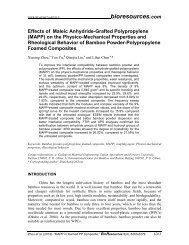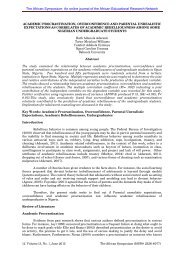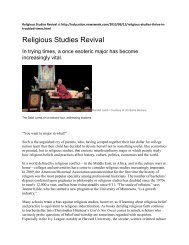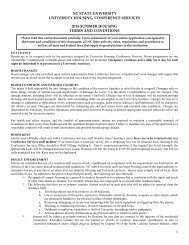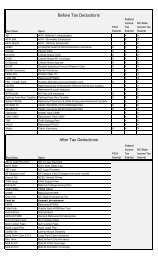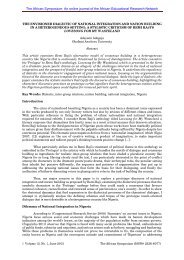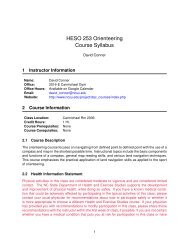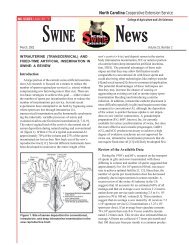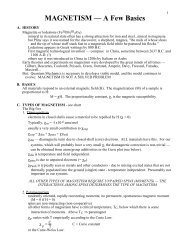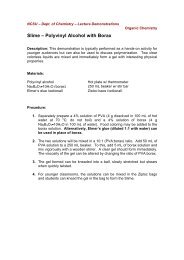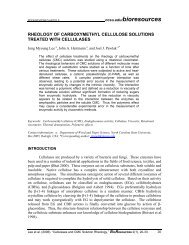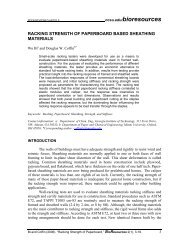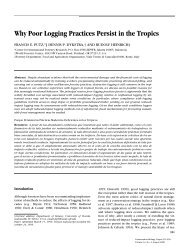Dictators, Songwriters, and the Negotiation of Censorship
Dictators, Songwriters, and the Negotiation of Censorship
Dictators, Songwriters, and the Negotiation of Censorship
Create successful ePaper yourself
Turn your PDF publications into a flip-book with our unique Google optimized e-Paper software.
Wilson<br />
did not attempt to use this format again until after <strong>the</strong> end <strong>of</strong> <strong>the</strong><br />
dictatorship. In <strong>the</strong> interim, he turned more <strong>and</strong> more <strong>of</strong>ten to fictional<br />
characters or fictional l<strong>and</strong>s.<br />
Simply avoiding <strong>the</strong> anecdotal form may not have been enough to<br />
escape censorship, though, if <strong>the</strong> language was too traditional. Ano<strong>the</strong>r<br />
tendency that developed in <strong>the</strong> interaction with censors was a move away<br />
from rational discourse in favor <strong>of</strong> a more oblique poetic discourse. “Las<br />
increíbles aventuras del señor Tijeras”, in <strong>the</strong> version that was ultimately<br />
allowed, is a depiction <strong>of</strong> <strong>the</strong> work <strong>of</strong> <strong>the</strong> <strong>of</strong>ficial state censor. Ra<strong>the</strong>r than a<br />
descriptive anecdotal account in rational discourse, it is a somewhat surreal<br />
narration that is merely suggestive. It is a parable: Señor Tijeras is a state<br />
censor charged with removing indecency from films, <strong>and</strong> <strong>the</strong> narrator<br />
follows him throughout his day <strong>and</strong> late into <strong>the</strong> night as he works, with his<br />
“Tijeras plateadas,” mutilating a film starlet’s performance. Though not<br />
difficult to read an indictment <strong>of</strong> <strong>the</strong> hypocrisy, cruelty <strong>and</strong> mean-<br />
spiritedness <strong>of</strong> <strong>the</strong> censor, <strong>the</strong> word “censor” is never used, nor are <strong>the</strong>re<br />
any o<strong>the</strong>r direct references to <strong>the</strong> government. Instead, <strong>the</strong> listener must<br />
use inference to get <strong>the</strong> whole picture; no one line is really objectionable. It<br />
is only when <strong>the</strong> song is taken in its entirety that <strong>the</strong> bitterly sarcastic<br />
criticism comes into focus.<br />
The song’s first version was not so oblique. Perhaps drawing on<br />
Lorca’s “Oficina y denuncia” from Poeta en Nueva York, <strong>the</strong> original last<br />
verse proclaimed:<br />
Yo detesto a la gente que tiene el poder<br />
de decir lo que es bueno y que es malo también,<br />
sólo el pueblo, mi amigo, es capaz de entender<br />
los censores de ideas temblarían de horror<br />
ante el hombre libre<br />
con su cuerpo al sol (ll. 32-7, emphasis mine).<br />
In this earlier version, not only did <strong>the</strong> voice break into a direct statement<br />
<strong>of</strong> opinion, but did so using key taboo words such as “el poder,” “el pueblo”<br />
<strong>and</strong> “los censores,” apparently triggering a negative response from censors.<br />
62



